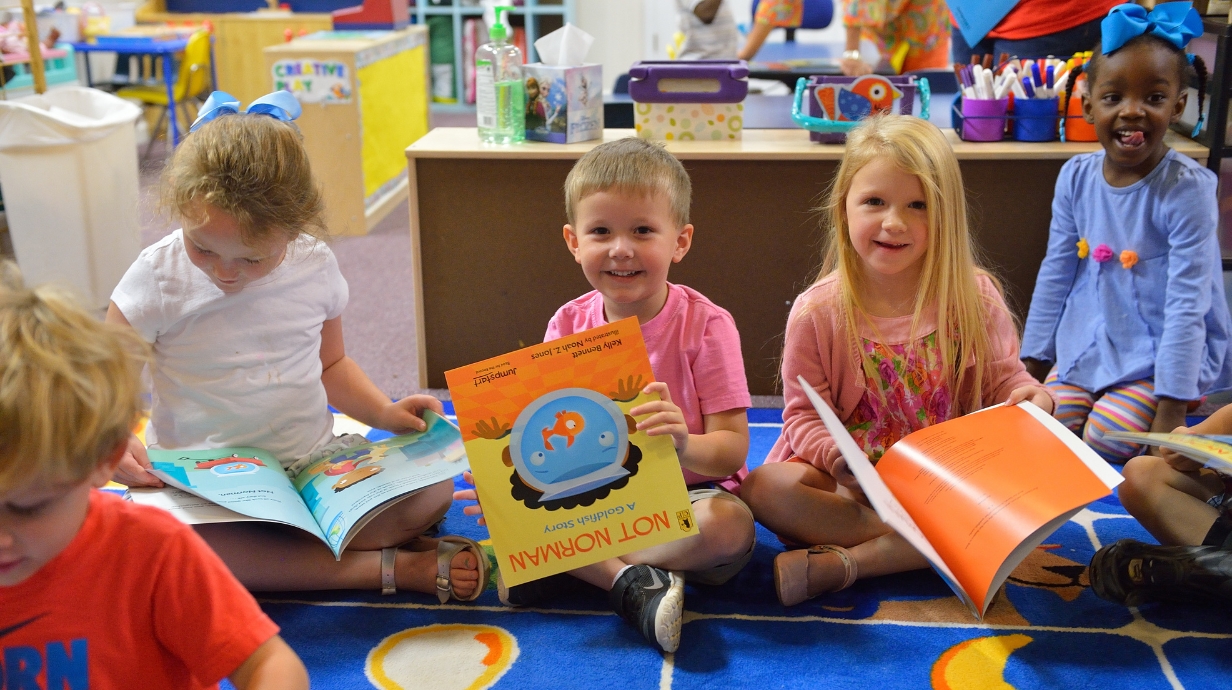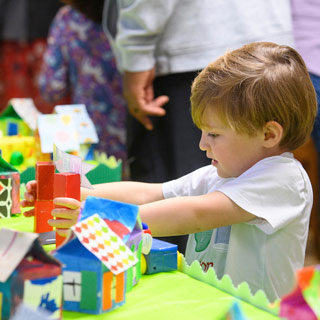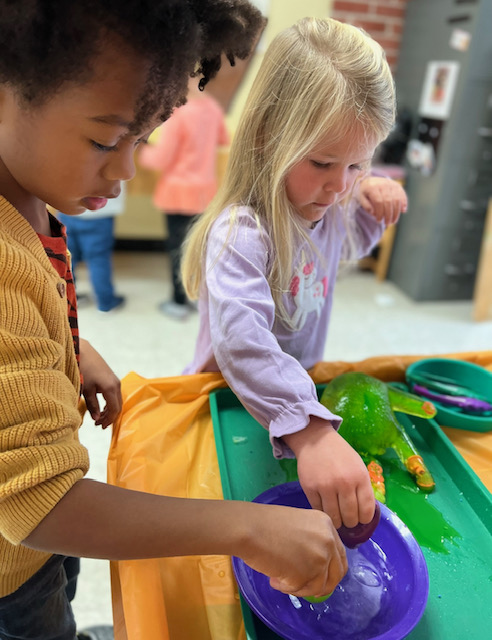Early Childhood Education, B.A.
Learn strategies to incite children's curiosity and help them meet the development milestones necessary to become lifelong learners.

About the Bachelor of Arts in Early Childhood Education
The experiences and interactions that children have during early childhood have a lasting impact on their future well-being and success. Early Childhood Educators are essential to providing enriching and nurturing environments that support young children’s creativity, curiosity, love for learning and overall development.
- Students who pursue the B.A.Ed. in Early Childhood Education learn to become effective early childhood educators who use innovative strategies to lay the foundation for young students' future literacy, problem-solving abilities, social skills, and confidence.
- Our program is approved for a Birth-K license. Students will be eligible for the Special Education Endorsement once passing the Foundations of Reading Test.
Graduates of the B.A.Ed. in Early Childhood Education program become professionals in a variety of roles. They go on to teach in public, private, or corporate school settings, childcare centers, early interventionists, or they may become Childcare Center Directors.
As local, state, and national advocates, graduates promote the education and well-being of young children across the country.
On this Page…
Program Information
Degree
B.A.Ed. in Early Childhood Education
Emphases
N/A
Required Credit Hours
124 Hours
Program Type
Major
Program Location
School
Duration
4 Years
Explore Everything the B. A. in Early Childhood Education has to Offer
Applicants to the program must meet these requirements:
- 2.5 grade point average (entry admission for transfer students and change of major)
- 2.75 grade point average (admission for Phase II: Teacher Education Program) and appropriate scores on either the ACT, SAT or Praxis CORE* (link to Phase II information is posted above under Program Description)
*Praxis Core Exemption: Students are exempt from taking the Praxis CORE exam for admission to Phase II if they:
- Provide proof of an ACT score of at least a 21 composite (or SAT equivalent; View the SAT Equivalency Scoring sheet for more information) OR
- Have a cumulative GPA of 3.0 or higher on a minimum of 60 hours of completed coursework
Candidates in the teacher education program begin field placements in their sophomore and/or junior year.
- These placements are tied to courses and have a minimum number of hours required which candidates fulfill by the end of the semester as stated in the course syllabus.
- Candidates are paired with Clinical Instructors.
Course instructors provide guidelines to the candidates as to how the field placement should be completed. University Ssupervisors are not assigned to these placements.
METP 101, 102, 201, 202 – 10 hours for each course.
Courses with Field Experiences
EDCI 352 – Education, Society, and the K-12 Learner
(Early Childhood, Elementary, Health and Physical Education, Secondary, and Special Education)
- Field-based Assignments for EDCI 352: TeachLive Virtual Field Experience
EDCI 353 - Planning and Teaching Strategies for Effective Classroom Practice. (Early Childhood, Elementary, Health and Physical Education, Secondary, and Special Education)
- Field-based Assignments for EDCI 353:
- 25 hours in assigned classroom
- 1 Scheduled TeachLive scession
- Prepare a written unit plan
- Assist the supervising teacher
- Teach one or more lessons
EDEC 321 - Child Development Classroom observation(10 hours)paper
- The students will need to:
- Observe children in an early childhood education center
- Record what they observed about the children in each observation (day and time), and
- Interpret the information they collected in light of what is covered so far in the class. This part of their paper should include a discussion of some aspect of children's development (e.g., social, physical, moral, etc.) is addressed in the readings. Relate their observations to at least one of the theories/concepts/terms that is discussed in class.
- Reflect on what they learned as they type a brief reflection paper. How is this useful to their understanding of child’s development? How might this information influence their professional practices?
EDEC 304 Action Lab - Infant and Toddler Settings: Students enrolled in this course will be expected to complete twelve 2-hour fieldwork visits (24 clock hours) to a single infant or toddler classroom.
EDEC 312 ActionLab - ECE Child Guidance/ ClassroomManagement: Students enrolled in this course will be expected to complete twelve 2- hour fieldwork visits (24 clock hours) to and early childhood development center or preschool.
EDEC 402 Action Lab Placement in ECE Preschool: Students enrolled in this course will be expected to complete twelve 2-hour fieldwork visits (24 clock hours) to an early childhood development center or preschool.
Please note that EDEC 304, EDEC 312, are EDEC 402 are action lab classes that consist of twelve 2-hour fieldwork visits (24 clock hours) total for the courses taken for that semester.
EDRD 355 - Early Literacy Instruction (Early Childhood, Elementary & Special Education)
- Field-based Assignments for EDRD 355:
- 16 hours in the classroom
- Focused literacy observation as designated and planned by the course instructor
EDRD 400 - Reading Instruction (Elementary and Special Education)
- Field-based Assignments for EDRD 400:
- 5 hours in the classroom
- Comprehension strategy lesson plan implementation
EDSP 317 - Action Lab Seminar (Special Education Junior year second semester)
- Field-based Assignments for EDSP 335:
- 10 hours in classroom
- Observation
- Journal Reflections
- Field-based Assignments for EDSP 403:
- 20 hours in the classroom
- Observation
- Behavior Change Project
EDSP 327 - Classroom and Behavior Management (Early Childhood, Elementary, Health and Physical Education, Secondary, and Special Education)
- Field-based Assignments for EDSP 327:
- 10 hours designed by course instructor (Note:15 hours for Honors/METP)
EDSP 329 - Nature/Needs of Student with Severe Disabilities (Special Education)
- Field-based Assignments for EDSP 329:
- 10 hours in classroom
- Observation
- Journal Reflections
- Field-based Assignments for EDSP 407:
- 5 hours in classroom
- Observation
- Teacher Interview
EDSP 410 - Effective Instruction for Teaching in Inclusive Settings (Early Childhood, Elementary and Special Education) – this moves to EDSP 452 for SPED Majors
- Field-based Assignments for EDSP 410:
- 10 hours in classroom (elementary majors)
- Observation
- Unit Planning and Implementation
All teacher education candidates in the elementary, health and physical education, secondary, and special education programs are placed in one location during the senior year.
- The yearlong internship consists of senior practicum and student teaching.
- Candidates are paired with the same Clinical Instructor for the entire senior year.
All senior yearlong placements are overseen by a Uuniversity Ssupervisor and are based on the Interstate Teacher Assessment and Support Consortium Standards (InTASC) and Special Professional Association (SPA) Standards.
Senior Practicum - Early Childhood
During the first semester of an early childhood education teacher candidate’s senior year, the candidates will participate in EDEC 304 Action Lab - Infant and Toddler Settings, which includes twelve 2-hour fieldwork visits (24 clock hours) to a single infant or toddler classroom.
- Candidates will also attend university classes as scheduled each week (EDSP 410, EDEC 328, EDEC 400, EDEC 401, and PPL 363).
Student teaching in the State of Mississippi, as required by law, must be a full-time assignment for a minimum of twelve weeks. In the teacher education program described below, teacher education candidates are assigned to public schools for one full semester, which exceeds the minimum time required by law. Teacher education candidates will be working with a selected Clinical Instructor five days-a-week and will receive 9 hours credit for the student teaching experience.
Except for music education majors, placement for student teaching is in the same classroom as for senior practicum. Candidates majoring in elementary education are placed in grades K-6, and candidates majoring in secondary education are placed in grades 7-12. Candidates majoring in special education and music education are placed in grades K- 12. All junior and senior placements are coordinated through the SAFE office to ensure that candidates have diverse experiences throughout their teacher education program.
Only in extreme circumstances will a student teaching placement other than those listed above be considered. Candidates must submit to the SAFE office a written request, detailing reasons for the request, for placement exceptions six weeks prior to student teaching.
All candidates must enroll in EDCI 419 Classroom Assessment simultaneously with student teaching.
Requirements for Student Teaching
In order to be admitted to student teaching, a candidate must meet the following requirements:
Admission to the Phase II: Professional EducationCore
A minimum grade of “C” in professional education courses. If this minimum of “C” is not met, the course(s) must be retaken before enrolling in the next level of professional education courses
A minimum grade of “C” in content and related fields (secondary majors) and general education courses (early childhood, elementary, health and physical education, and special education majors).
Completion of all core and professional education courses
Completion of teaching and field experience courses (content and related field experiences courses). Completion of 15 hours in residency at The University of Mississippi (includes Tupelo, Desoto, Grenada, and Booneville campus centers). Note: Completion of 30 hours in residency is required for graduation
Completion of courses taken by correspondence for admission to student teaching (grade must be on file prior to admission)
Evidence of professional liability insurance
Evidence of a successful background check
During the student teaching semester candidates are required to enroll in 9 semester hours of student teaching and 3 hours of classroom management (EDCI 419). Only one additional (3-4 hour) elective course is allowed, restricting students to a maximum of 15-16 hours during the student teaching semester. This maximum number of hours may not include courses in the general or content related fields.
Find Courses in Early Childhood Education
Hands-On Experience


Receive Practical Experience in a NAEYC-Accredited Lab School
Our students don't solely rely upon case studies and textbook scenarios; they pursue practical experiences and research at the NAEYC-accredited Willie Price Lab School. WPLS is one of the 10% of child care centers, preschools, and kindergartens to receive this national recognition.
Did You Know?
in Mississippi for licensure preparation and first-year pass rates.
undergraduate scholarships are awarded each year.
Want to learn more?
We're glad your interested in our program! If you'd like to chat or just need more information, don't hesitate to reach out.
Kenya Elizabeth Wolff
Director of the Center for the Study of Early Learning and Associate Professor of Early Childhood Education
Next Steps
Explore Affordability
We have a variety of scholarships and financial aid options to help make college more affordable for you and your family.
Apply to the University of Mississippi
Are you ready to take the next step toward building your legacy?
